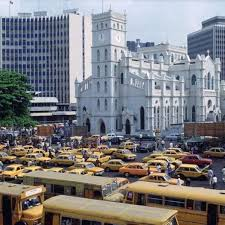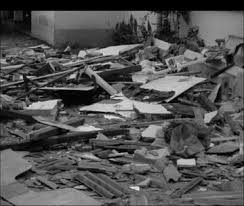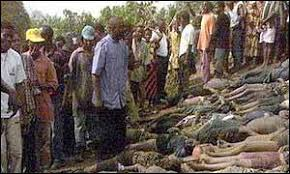The Lagos bombing of 1993 is a chapter of history that remains shrouded in mystery and controversy. While the incident rocked Nigeria’s most populous city, its story has often been overshadowed by political narratives and conflicting accounts. Who were the masterminds? What triggered the chaos? And most importantly, why has the truth remained elusive for so long? In this in-depth exploration, we’ll piece together the fragments of this tragic event to uncover the truth behind the 1993 Lagos bombing.
The Context: Lagos in 1993

Lagos – The Heartbeat of Nigeria
Lagos in the early 1990s was a bustling metropolis, the economic and cultural hub of Nigeria. With its sprawling markets, vibrant nightlife, and industrial base, it was a city of hope and opportunity.
Political Turbulence in Nigeria
The bombing took place against a backdrop of political unrest. Nigeria was in the throes of military dictatorship, with political instability, widespread protests, and calls for democracy dominating the headlines.
What Happened on That Fateful Day?
1. The Explosion
On January 27, 1993, Lagos was rocked by a massive explosion. The blast, originating from a military armory in the Ikeja area, triggered chaos, panic, and widespread destruction.
2. Immediate Aftermath

Buildings collapsed, fires raged, and smoke filled the air. Thousands of residents were displaced, with some fleeing the city in fear of further attacks.
3. Casualties

While official numbers were hard to come by, hundreds were reported dead, and many more were injured. Families mourned their loved ones, while survivors struggled to make sense of the devastation.
Conflicting Accounts: What Really Caused the Explosion?
1. Official Explanation
The Nigerian government attributed the explosion to an accidental fire at the military armory. Officials claimed that improper storage of explosives led to the tragedy.
2. The Sabotage Theory
Critics, however, argued that the explosion was no accident. Whispers of sabotage and insider complicity began circulating, with many pointing to the ongoing political unrest as a possible motive.
3. International Speculation
International observers weighed in, some suggesting that foreign powers or militant groups might have been involved. However, concrete evidence remained elusive.
The Human Cost of the 1993 Lagos Bombing
1. Displacement and Trauma
The explosion left thousands homeless. Families were uprooted, forced to seek shelter in makeshift camps or with relatives. The psychological scars of that day lingered for years.
2. Economic Impact
Businesses in the Ikeja area suffered massive losses. The destruction of infrastructure and loss of livelihoods added to the economic challenges already facing Lagos.
3. Stories of Heroism
Amid the tragedy, stories of resilience emerged. Neighbors helped one another escape collapsing buildings, while first responders risked their lives to save others.
Investigations: The Search for Answers
1. Government Investigations
The Nigerian military conducted an internal investigation, but its findings were criticized for lack of transparency. Many believed the inquiry was a cover-up.
2. Independent Probes
Journalists and human rights groups launched their own investigations. These efforts uncovered discrepancies in official accounts, adding fuel to the sabotage theory.
3. International Involvement
Global organizations called for a more thorough investigation, but the political climate in Nigeria made such efforts challenging.
Also Read; Weird Facts About the World’s Largest Animal: The Blue Whale
The Role of the Media
1. Initial Reporting
Local and international media covered the bombing extensively, highlighting the scale of the devastation.
2. Censorship and Propaganda
As suspicions grew, the government sought to control the narrative, censoring dissenting voices and promoting its version of events.
3. Uncovering the Truth
Over the years, investigative journalism has played a critical role in shedding light on the 1993 Lagos bombing, keeping the story alive.
Conspiracy Theories Surrounding the Bombing
Political Motives
Some theories suggest that the bombing was orchestrated to divert attention from political scandals or suppress opposition movements.
Foreign Interference
Others point to foreign powers with vested interests in Nigeria’s resources and politics.
Insider Betrayal
There are also claims that individuals within the military may have played a role, either through negligence or deliberate sabotage.
Lessons Learned from the Lagos Bombing
The Importance of Safety Protocols
The tragedy underscored the need for proper handling and storage of military explosives.
Transparency in Governance
The lack of clear answers highlighted the importance of accountability and transparency in addressing national tragedies.
Strengthening Emergency Response
The incident revealed gaps in Nigeria’s disaster preparedness, prompting calls for better emergency response systems.
The Legacy of the 1993 Lagos Bombing
Memorializing the Victims
Efforts have been made to remember those who lost their lives, with memorials and annual tributes.
Impact on Urban Planning
The explosion influenced urban planning policies, particularly around the storage of hazardous materials in densely populated areas.
A Catalyst for Change
For many, the tragedy became a rallying point for calls for democracy and better governance in Nigeria.
The Future: Ensuring It Never Happens Again
Policy Changes
Stricter regulations on the storage and transportation of explosives have been implemented to prevent similar incidents.
Technology and Monitoring
Advances in technology now allow for better monitoring of military installations, reducing the risk of accidents.
3. Continued Vigilance
The memory of the 1993 Lagos bombing serves as a reminder of the importance of vigilance and preparedness in safeguarding lives.
Conclusion
The 1993 Lagos bombing was more than just a tragic event—it was a wake-up call for a nation grappling with political turmoil and systemic challenges. While the full truth may never be known, the lessons learned from that day continue to shape Nigeria’s path forward. By remembering the victims and striving for accountability, we honor their legacy and ensure that history does not repeat itself.
Also Read; Fashion and Identity: How Clothing Choices Reflect Who We are
FAQs
1. What caused the 1993 Lagos bombing?
The official explanation is an accidental fire at a military armory, but many believe sabotage or negligence played a role.
2. How many people died in the Lagos bombing?
While exact numbers are unclear, hundreds of fatalities were
2. How many people died in the Lagos bombing?
While exact numbers are unclear, hundreds of fatalities were reported, and thousands were injured or displaced due to the explosion.
3. Was anyone held accountable for the bombing?
No individuals or groups were officially held accountable. The government conducted an investigation, but many criticized its findings as incomplete or biased, leaving questions unanswered.
4. How did the Lagos bombing impact Nigeria’s military policies?
The tragedy prompted discussions around better safety protocols for handling and storing military explosives. Over time, stricter regulations and improved monitoring systems were introduced to prevent similar incidents.
5. What is being done to preserve the memory of the victims?
Memorials and annual remembrance events have been established by communities and advocacy groups. These efforts aim to honor the victims and ensure that the incident remains a part of Nigeria’s historical consciousness.
This article delves deep into the tragic events of the 1993 Lagos bombing, examining its causes, aftermath, and long-term impact. Through exploring this untold story, we can learn valuable lessons about transparency, accountability, and resilience in the face of tragedy.


